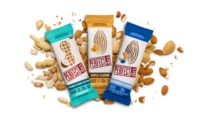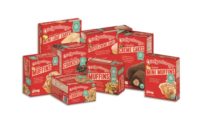An exclusive interview with the founders of Munk Pack












According to the 2017 International Food Information Council Foundation “Food & Health Survey,” nearly two-thirds of Americans are trying to add more protein to their diet, up from 54 percent in 2015 and 50 percent in 2014. Meanwhile, plant protein continues to hold an increasing level of appeal for shoppers.
These trends fit perfectly with the winner of this year’s Snack Food & Wholesale Bakery “Best Healthy School Snacks” contest, highlighting new snacks and baked goods particularly suited to meeting the nutritional needs—and taste preferences—of today’s youth.
This year, Munk Pack, Greenwich, CT and its line of Protein Cookies line overwhelmingly took the top spot. The soft-baked cookies offer 18 grams of plant protein and are a “good source” of fiber at 6 grams of fiber per cookie. They’re also non-GMO, gluten-free and vegan; do not contain sugar alcohols, trans fats, dairy, soy or eggs; feature monk fruit extract as a sweetener; and three of the four cookies also include decaffeinated green tea extract. The company notes that the ingredient makeup includes a nutritious blend of nuts, grains and brown rice protein that provides a complete amino acid profile.
Four varieties are available: Coconut White Chip Macadamia, Double Dark Chocolate, Peanut Butter Chocolate Chip and Oatmeal Raisin Spice.
We reached out to Munk Pack, co-founders Michelle and Tobias Glienke, who formerly worked in corporate law and finance, to gain some insight into the line of cookies.
Douglas J. Peckenpaugh: What inspired you to leave your former jobs and get into the food industry?
Michelle and Tobias Glienke: We saw a lack of healthy, non-perishable snacks in the market that catered to various dietary restrictions, and decided to fill that gap with our own innovations. Entering the natural food industry has been an amazing opportunity to merge our personal interests in nutrition and wellness with our professional careers. Not many people can say that they are passionate about their jobs, and given that we had decided to found our own company, it was important that we were working ’round the clock on something we truly cared about, that aligned with our personal values.
DJP: What were the biggest challenges of moving from farmers’ markets to commercial-level production?
MG and TG: Our vision was always to produce our products on a larger scale for national distribution, so when producing in a commercial kitchen, it was with the purpose of learning, perfecting the recipes, and developing process techniques that we could later scale-up. That certainly helped with the transition to commercial-scale production. However, the greatest challenge was getting the contract manufacturer to adjust their existing processes to meet our product specifications.
DJP: Why did you choose to make nutritional, better-for-you cookies?
MG and TG: Performance athletes who enjoy our Oatmeal Fruit Squeeze products were asking us to also develop a higher-protein, higher-calorie nutritional product. The market was already saturated with protein bars and shakes, so we wanted to be a bit more creative and create the first protein cookie that was both gluten-free and vegan. The cookie is a fun way to have a healthy snack—with lower sugar per gram of protein than most energy bars—as well as a high-protein treat.
DJP: What does having a “clean” ingredient label mean to you?
MG and TG: Nothing is as “clean” as eating a plain apple or piece of raw broccoli. When you enter the world of packaged foods, having a clean label is about maximizing whole-food ingredients and minimizing fillers and unidentifiable flavors. Our idea of a clean label is minimizing the list of ingredients, and excluding anything that sounds like a science experiment. It’s also about transforming traditional formulas for packaged products—such as instant flavored oatmeal or cookies—and removing the artificial flavors, colors, stabilizers, maltodextrin, sodium caseinate, potassium sorbate, etc.
DJP: What are the origins of the company name?
MG and TG: Our brand name centers around the chipmunk, which is an adventurous animal that only eats whole foods from nature, while always on the go. Chipmunks are actually highly selective eaters, with a diet of fruits, nuts, seeds and grains. We love their adventurous spirit, and through Munk Pack we mirror their nutritious, balanced diet for on the go.
DJP: How did you settle on using monk fruit extract as a sweetener in the cookies?
MG and TG: Monk fruit extract is a zero-calorie, zero-sugar sweetener that is natural and plant-based. It was important to us to add just a touch of sweetness without contributing to metabolic and digestive issues the way that other sweeteners, such as sugar alcohols, can do.
DJP: What made you select brown rice protein vs. other plant protein sources on the market?
MG and TG: Nutrition and taste are the main considerations for every ingredient we put into our products. Brown rice protein is a clean, plant protein that doesn’t create an aftertaste the chalky mouthfeel that is often experienced with other types of protein powders. There are other plant protein sources that are also good options, such as seed proteins or pea protein; of these we selected what tasted best in our products. Also, by pairing rice protein with peanut butter, which is a legume, our protein cookies are a complete source of protein.
DJP: Three of the cookies use green tea extract. What does this ingredient bring to the formula?
MG and TG: Green tea extract is a natural antioxidant. The goal in using this is to protect the nutrients and flavor over the shelf life of the product.
DJP: What’s next for Munk Pack?
MG and TG: We’ve got some exciting projects in the pipeline! We love to innovate here at Munk Pack, and we are excited by what we see as an open frontier for innovation—particularly in the vegan market segment. We are creating a portfolio of healthy snacks and meals that are free of dairy, egg, soy, gluten, and GMOs, and that particularly fulfill the demand for healthy breakfast on the go.
Looking for a reprint of this article?
From high-res PDFs to custom plaques, order your copy today!












